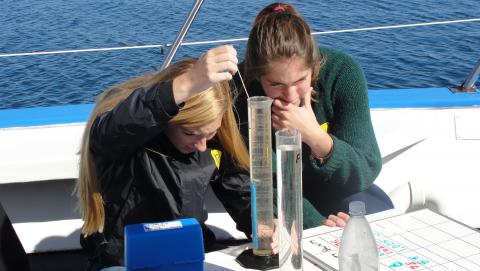
Board a U.S. Coast Guard-inspected passenger vessel in Seabrook or Rye Harbor or come with your class to the UNH Pier in New Castle and explore marine science. In five stations, your students will measure and test WATER for dissolved oxygen, salinity and acidity; investigate BENTHIC creatures and learn how they adapt to their environment; catch PLANKTON and study zooplankton in a Discovery Scope; identify phytoplankton under a microscope and locate and identify fish in the GULF OF MAINE ecosystem; NAVIGATE the charts and bearings to find the catch of the day.
These "hands- on" exploratory floating Lab trips are designed for middle and high school students and provide support for many of the science standards. Trained volunteer UNH Marine docents lead the "stations" and make this outdoor "classroom" fun and memorable!
Bring a small group of students (25-30) to a floating lab on a passenger vessel; bring a larger group (up to 110 students) to the floating lab at the UNH Pier in New Castle. At the UNH Pier, we add visits to the UNH Marine Research Lab, to the historic Portsmouth Lighthouse and a trip on the UNH research vessel. In each case, we will work with you to fit the program into your curriculum needs.
The trips take place in the spring and the fall on Tuesdays, Wednesdays, or Thursdays.
Know Before You Go
What is a Coastal Floating Lab? Schools & groups come to the UNH Pier and experience marine science dockside and on the water. Enjoy watching this video of our Coastal Floating Lab Program.
This program takes place on research vessels and on a working research pier. Working research vessels provide insight on how marine research is conducted and therefore do not provide amenities one might find on a passenger vessel. Participants must be prepared to stand for the duration of the program and will have limited protection from sun, rain or spray. Access to the vessel is via a steep floating ramp. The slope of the ramp varies with the tide.
Participants requiring the use of an American Sign Language interpreter or assistive listening device should contact Dari Christenson at dari.christenson@unh.edu at least two weeks prior to Floating Lab date.